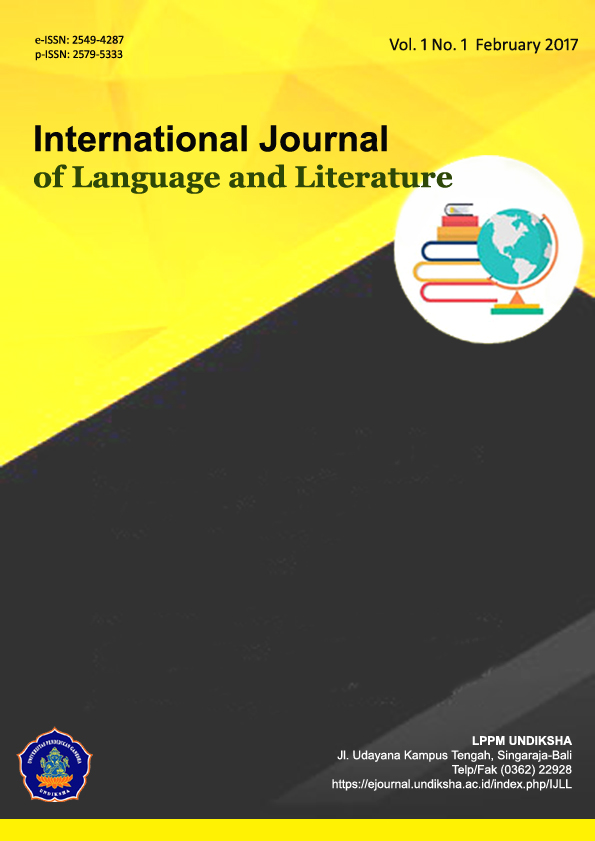PEDAGOGICAL CONTENT KNOWLEDGE OF TEACHING ENGLISH TO YOUNG LEARNERS: THE DEGREE OF CONSISTENCY BETWEEN ENGLISH TEACHERS’ PERCEPTIONS AND IMPLEMENTATION
DOI:
https://doi.org/10.23887/ijll.v4i1.30222Keywords:
teachers’ perceptions, pedagogical content knowledge (PCK), teaching English, young learnersAbstract
The study aimed at analyzing English teacher perceptions and its implementation of Pedagogical Content Knowledge (PCK) of teaching English for young learners and the comparison between teachers perceptions’ and its implementation by English Primary School in Denpasar. This research used mixed method design with a qualitative dominant. The subjects of this research were three teachers from three different schools in Denpasar who taught English for young learners. Convenience sampling techniques was used in selecting subjects and schools. This research used 4 instruments to get the data, namely: the researcher (2) questionnaire of teachers’ perceptions of pedagogical content knowledge, observation sheet to record teachers’ PCK implementation and (4) interview guide. The result showed the average score of teachers’ perceptions was 3.85 which categorized as high with the interval 3.3335 ≤ M ≤ 4.0005. The average score teachers’ implementation was 8.85 which categorized as low with the interval 7.84 ≤ M ≤ 13.06. In addition, the study found discrepancy between teachers’ perceptions and its implementation. Since the perceptions was in a high category and the implementation was in a low category, this comparison falls in a no consistency category. Such discrepancy caused by the lack of teaching preparation, the uninteresting teaching strategy which included few to no media and the monotonous teaching sources. Teacher professional awareness to do Continuing Professional Development (CPD) for English teachers at primary education needs to be reinforced as an effort of quality assurance.References
Aimah, S., & Purwanto, B. (2018). Indonesian teachers’ perception on the implementation of lesson study: exploring teachers’ awareness of pedagogical knowledge. Arab World English Journal (AWEJ), 9(4), 380–391. DOI: https://dx.doi.org/10.24093/awej/vol9no4.28 DOI: https://doi.org/10.24093/awej/vol9no4.28
Aini, W. N. (2013). Instructional media in teaching english to young learners: a case study in elementary schools in kuningan. Journal of English and Education, 1(1), 196–205.
Andrews, S. J. (2001). The language awareness of the L2 teacher : its impact upon pedagogical practice. Language Awareness, 10(2), 75-90. DOI: https://doi.org/10.1080/09658410108667027
Arikunto, Suharsimi. (2003). Dasar – Dasar Evaluasi Pendidikan. Jakarta: PT. Bumi Aksara.
Cakir, I. (2004). Designing activities for young learners in efl classrooms. GÜ, Gazi Eğitim Fakültesi Dergisi, 24(3), 101–112.
Coleman, H. (2010). The English Language in Development. Retrieved from https://www.teachingenglish.org.uk
Creswell, J. W. (2014). Research design: qualitative, quantitative and mixed method approaches (4th ed). United States, America: Sage Publications, Inc.
Faisal, F. (2015). Pedagogical content knowledge in indonesian english language teaching. Asia Pacific Journal of Multidisciplinary Research, 3(5), 103-110
Huda, N. (2000). Kedudukan dan fungsi bahasa asing (the position and function of foreign languages). In H. Alwi dan D. Sugono, Politik bahasa: risalah seminar politik bahasa (Language Politics: Procedings of the Seminar on Language Politics), 59-78. Jakarta: Pusat Bahasa dan Departemen Pendidikan Nasional.
Ibrahim, B. (2016). Pedagogical content knowledge for teaching english. English Education Journal (EEJ), 7(2), 155–167.
Jansen, G. G., & Jansen, G. G. (2000). Improving Validity and Reliability in STAT 2000 Assessments by Gregory Gerard Jansen (Under the Direction of Jennifer J. Kaplan)(Dissertation, The University of Georgia in Partial Fulfillment : Georgia).
Juhana (2014). Teaching english to young learners : some points to be considered. Asian Journal of Education and e-Learning, 2(01), 43-46.
Koyan, I. W. (2012). Statistik pendidikan teknik analisis data kuantitatif. Singaraja: Undiksha Press.
Kultsum, U. (2017). The concept of pedagogical content knowledge ( pck ): recognizing the english teachers ’ competences in indonesia. Advances in Social Science, Education and Humanities Research, 134(Icirad), 55–59. DOI: https://doi.org/10.2991/icirad-17.2017.11
Lauder, A. (2008). The status and function of english in indonesia : a review of key factors. Makara Sosial Humaniora, 12(1), 9–20. DOI: https://doi.org/10.7454/mssh.v12i1.128
Liu, S. (2013). Pedagogical content knowledge : a case study of esl teacher educator. English Language Teaching, 6(7), 128–138. DOI: https://dx.doi.org/10.5539/elt.v6n7p128 DOI: https://doi.org/10.5539/elt.v6n7p128
Listyariani, N. P. R. (2019). Teachers’ perceptions of teaching English for young learners and the implementation in public primary school in jembrana regency. Unpublished Thesis. Singaraja: Universitas Pendidikan Ganesha DOI: https://doi.org/10.23887/jpbi.v6i2.2710
Magnusson, S., Krajcik, L., & H. Borko. (1999). Nature, sources and development of pedagogical content knowledge. In J. Gess Newsome & N.G. Lederman (Eds.), Examining Pedagogical Content Knowledge (pp. 95-132). Dordrecht: Kluwer Academic. DOI: https://doi.org/10.1007/0-306-47217-1_4
Miles, M. B., & Huberman, A. M. (1994). Qualitative data analysis (2nd ed). United States, America: Sage Publication. Inc.
Medwell, J. et.al. (2009). Primary English: Teaching Theory and Practice. Trowbridge: Cromwell Press Group Ltd.
Shulman, L. S. (1986). Those who understand knowledge growth in teaching. Educational Researcher, 15(2), 4–14. DOI: https://doi.org/10.3102/0013189X015002004
Utami, I. G. A. L. P., Prestridge, S., Saukah, A., & Hamied, F. A. (2019). Continuing professional development and teachers ’ perceptions and practices - a tenable relationship. Indonesian Journal of Applied Linguistics, 9(1), 108-118 https://doi.org/10.17509/ijal.v9i1.12463 DOI: https://doi.org/10.17509/ijal.v9i1.12463
Zein, M. S. (2018). Elementary english education in indonesia : policy developments, current practices, and future prospects. English Today, 33(1), 53-59. https://doi.org/10.1017/S0266078416000407 DOI: https://doi.org/10.1017/S0266078416000407
Downloads
Published
How to Cite
Issue
Section
License
IJLL Journal provides immediate open access to its content on the principle that making research freely available to the public to supports a greater global exchange of knowledge.

This work is licensed under a Creative Commons Attribution-ShareAlike 4.0 International License







